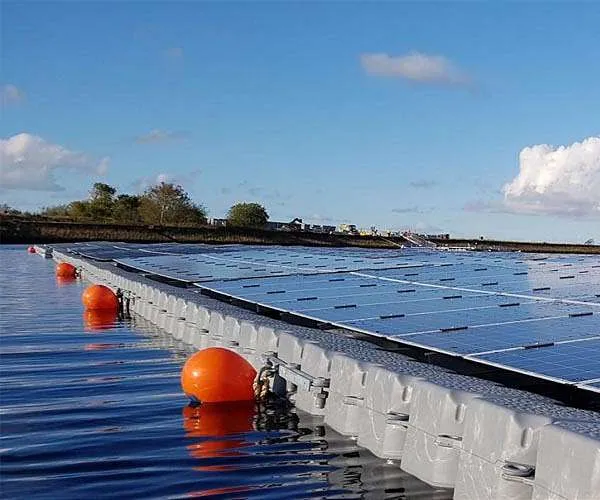Floating solar farms can help reduce impacts of climate change on lakes and storage tanks
- Floating solar farms can aid to safeguard lakes and storage tanks from several of the damages of environment modification, a brand-new research recommends.

Nonetheless, offered the complex nature of water bodies as well as varying designs of solar technologies, there can also be detrimental ecological community impacts of deploying floating solar arrays.
Traditional solar farms are debatable due to the quantity of land they use up. This is leading to enhancing interest in floating solar farms - using the additional area that bodies of water offer.
Until now, there are 3 commercial-size floating solar arrays in the UK, and hundreds a lot more throughout the world. The number of installations is likely to grow considerably in coming decades as demand climbs for renewable energy resources with even more nations dedicating to internet absolutely no carbon targets.
Nonetheless, little is found out about the effects - both positive and negative - these floating solar farms are having on the lakes and also storage tanks they are set up on - previously.
Scientists from Lancaster University and also the University of Stirling have completed the initial in-depth modelling of the ecological results of floating solar setups on bodies of water.
" As demand for land rises, water bodies are increasingly being targeted for renewable energy. Implementation of solar on water enhances electrical power production, yet it is important to recognize if there will be any kind of favorable or adverse ecological consequences," claimed Mr Giles Exley, PhD researcher and also lead author from Lancaster University.
" Offered the loved one immaturity of floating solar farms, it is necessary to more scientific evidence of the impacts. Our outcomes provide preliminary understanding of the essential impacts that will certainly help educate water body supervisor and also policy maker decisions."
The research team undertook computer system modelling using the MyLake simulation programme as well as information collected by the UK's Centre for Ecology and also Hydrology from England's largest lake, Windermere. Although the researchers think it is not likely floating solar farms will certainly be released on Windermere, it offers a rich data-set as it is just one of the most comprehensively researched lakes in the world.
Their results reveal that floating solar arrays can cool down water temperatures by shading the water from the sunlight. At scale, this might aid to reduce versus unsafe effects brought on by worldwide warming, such as blossoms of hazardous blue green algae, as well as raised water evaporation, which might threaten water supply in some regions.
The scientists discovered that floating solar setups additionally minimize the duration of 'stratification' - this is where the sun heats up the water, forming distinctive layers of water at various temperature levels. This often tends to take place much more in the warmer summertime and also can cause the bottom layer of water ending up being deoxygenated, which wears away water top quality - an apparent problem for products of alcohol consumption water. Nevertheless, the picture is complex and also there are also conditions under which stratification, and also for that reason damaging water quality impacts, could raise if floating solar farms are released.
Mr Exley stated: "The results of floating solar on the temperature level of the water body and also stratification, both of which are significant motorists of biological as well as chemical processes, could be equivalent in magnitude to the modifications lakes will experience with climate adjustment. Floating solar could help to mitigate against the unfavorable results worldwide warming will carry these bodies of water."
" Nevertheless, there are likewise genuine threats of harmful effects, such as deoxygenation triggering undesirable boosts in nutrient focus and eliminating fish. We require to do more research study to understand the probability of both favorable and unfavorable effects."
The results on water temperature raised the bigger the solar installment, with tiny selections of less than 10 percent of the lake surface area usually having very little effects. However, this version concentrated on one lake. Further studies will certainly be needed to establish the maximum size range, and also layout, and also their results for individual lakes and storage tanks - all of which have one-of-a-kind qualities. Different layouts of solar installations also have various shading and safeguarding impacts for the sun and wind.
Ranges covering more than 90 percent of a lake might boost the possibilities of the lake freezing over in winter season, the research located - though these effects would certainly also specify to the body of water and layout of the installment and also call for further studying.
Field research studies and also additional modelling work to improve these preliminary findings is continuous.
Also read

